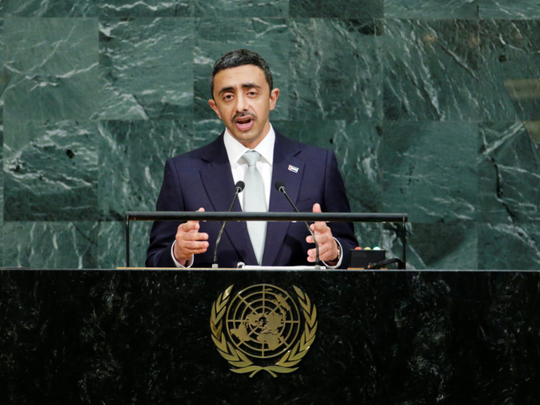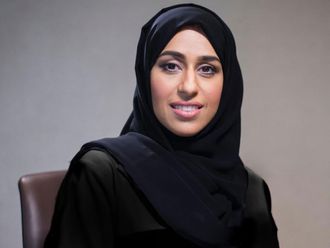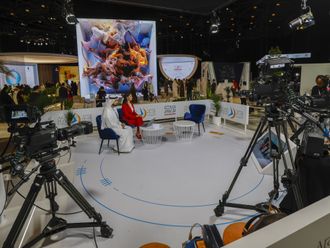
Dubai: Iran is in deliberate violation with a nuclear deal it reached with world powers, UAE foreign minister Abdullah Bin Zayed has said.
“Iran continues to develop and conduct more ballistic missile tests in a deliberate violation of the spirit of the nuclear agreement. Therefore, we support enhancing controls on Iran’s nuclear programme and continued assessment of the agreement and its provisions.”
Also, there has been no sign of change in its hostile behaviour in the region since the deal was reached two years ago, he pointed out.
He singled out Iran as the main instigator of crises in the region pointing to its army of terrorist groups like Al Houthis in Yemen and Hezbollah in Lebanon.
Iran-backed cells have also been discovered in Iraq, Syria, Saudi Arabia, Bahrain and Kuwait whose purpose is to destablise the host countries, he pointed out.
“Iran has not only committed blatant violations of the principles of sovereignty but also continues to exploit the crises in the Arab world to undermine regional security by inciting and fueling conflict. Iran must realise that peaceful co-existence based on respect for sovereignty in the region is the best basis for a harmonious relationship with the states of the Arabian Gulf,” he emphasised.
During his statement, Sheikh Abdullah also reaffirmed the UAE’s firm position and its legitimate right to sovereignty over its three islands, Greater Tunb, Lesser Tunb and Abu Musa, which are occupied by Iran in violation of the provisions of International Law and the Charter of the United Nations.
“We will not abandon our demand for Iran to return the occupied islands to their rightful owners, either voluntarily or through the peaceful means that are available for the resolution of international disputes, particularly through the International Court of Justice,” he explained.
Shaikh Abdullah said the international community should do more to restore stability in the Arab world—particularly in Libya, Syria, Yemen and Somalia, where he said that it is necessary to “protect the development progress that has been made, and prevent any party from obstructing or wrecking collective efforts at peacebuilding. Otherwise, we will be reduced to managing these conflicts instead of being able to solve them.”
“In those countries, comprehensive political solutions can be achieved. Stability can be restored. But this will only be possible if we put a stop to outside interference in Arab affairs, and prevent any form of support from being given to extremist and terrorist groups. “We support UN efforts to bring warring parties to the negotiating table and achieve comprehensive political solutions,” he added.
“Terrorism and extremism should be rejected in all of its manifestations,” he said.
Shaikh Abdullah cited the outcome of the Riyadh Summit this year where Arab and Islamic world leaders firmly rejected terrorism and its ideological roots.
“We believe that the elimination of this threat from our Arab region is within our reach. The liberation of ancient Arab cities with a rich history, such as Mosul in Iraq and Al Mukalla in Yemen from the grip of terrorist organisations is proof of this. It shows what can be achieved when we work together to combat extremism and terrorism,” he continued.
This is why the UAE, in conjunction with Saudi Arabia, Bahrain and Egypt chose to take action against Qatar.
“Collective action was needed to single out countries that support and finance terrorism and hold them accountable.”
Countries who make alliances with organisations that seek to undermind peace and security in the Arab world will lose, he warned.
What else did Shaikh Abdullah say?
- The provocative behaviour of North Korea, through its continued development of its nuclear programme and ballistic missiles, is a threat to global security and stability
- Human development should be our top priority to fight extremism and protect the people in this region from conflict. The UAE is committed to achieving economic and human progress, and to contribute to rehabilitation and reconstruction projects in conflict-affected countries, to enable their national institutions to undertake their role in restoring security and stability.
- The UAE remains dedicated to alleviating the suffering of refugees and supports international and regional efforts to protect them and improve their conditions by providing humanitarian and development assistance. Managing crises is not a sustainable solution to this phenomenon and the root causes must be addressed.
- The UN should find solutions to the humanitarian and political crises in Myanmar. The UAE condemns acts of violence, displacement and collective punishment committed against the Rohinya and will continue to provide humanitarian assistance and support.
- The UAE rejects Al Houthi rebels obstinance in accepting a political settlement to the crisis in Yemen. The rebels have disrupted and delayed numerous humanitarian relief efforts. The UAE remains a committed member of the Arab coalition fighting to restore Yemen’s internationally-recognised government under the wise leadership of Saudi Arabia. The UAE pledges to continue to assist the Yemeni people with their humanitarian and human development needs.
- The UAE has moved on from fulfilling the basic needs of its people, including health and educational services and is adopting a model based on the principles of good governance to tolerance to build a happy society. By ensuring the provision of a safe environment to enable women and youth to fulfil their dreams and ambitions, and engage in the development of their country, this has allowed the UAE to pioneer innovations and ground-breaking achievements, and to become a beacon of hope for the younger generation throughout the region, Shaikh Abdullah explained. The UAE is cognizant that its greatest challenge is to make its development sustainable and prepare itself for the post-oil era.












